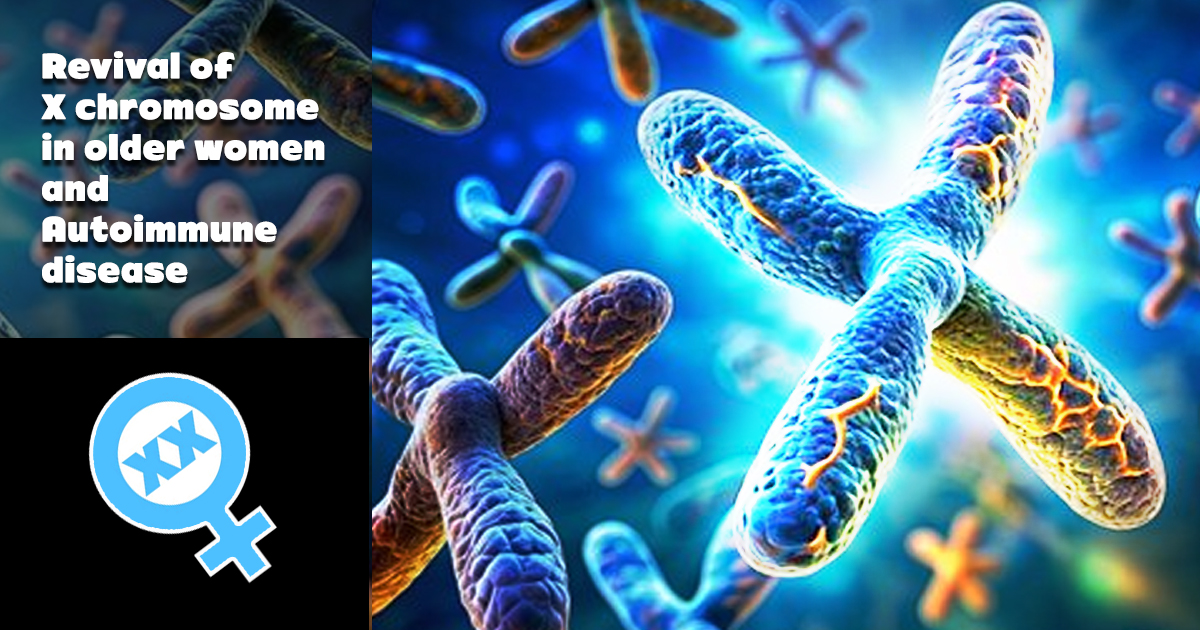
X chromosome revival in older women increases risk of autoimmune disease
GS Paper III:
Questions related to biotechnology or genetic engineering might benefit from knowing about chromosomes. These fields use techniques like Karyotyping (Chromosomal Analysis).
If a question asks about advancements in Genetics or the Human Genome Project, a basic understanding of chromosomes would be helpful. Chromosomes are the physical carriers of genes, and understanding their structure and function is crucial in these fields.
Role of X Chromosomes
In mammals, the females have two copies of the X chromosome, while the males carry a single copy. The X chromosome is more significant for its role in determining sex.
Recent genomic studies have shed light on the fundamental biological processes the X chromosome modulates and the genes it encodes. The gathering evidence suggests, in fact, that it plays a part in a variety of biological functions. It also controls the sex-specific susceptibility to certain diseases.
The human X chromosome encodes around 800 genes, which in turn code for proteins. A loss of function for these genes could thus lead to a variety of genetic diseases.
Broadly, the diseases whose onset and/or progression the X chromosome influences can be grouped into three types. These include (i) X-linked genetic diseases, (ii) diseases influenced by XCI escape, and (iii) those linked to X-chromosome aneuploidy.
There are more than 500 X-linked genetic diseases, and they mostly affect males. Many of the X-linked traits and diseases are not uncommon in the general population.
For example, red-green colour blindness is X-linked. It affects around 8% of males. Duchenne muscular dystrophy is caused by mutations in the dystrophin gene. This affects 1 in every 3,500–5,000 boys born in India. Agammaglobulinemia is an immunodeficiency disorder that affects around 1 in 200,000 live births.
Scientists are also aware of numerical abnormalities — or aneuploidies — of the X chromosome. For example, An extra X chromosome (XXY) signifies Klinefelter syndrome. A loss of one X chromosome in females (X instead of XX) signifies Turner’s Syndrome.
Inactivation of X chromosome
In mammalian species, females typically carry two X chromosomes, while males possess one X and one Y chromosome. The parents contribute to each of the X chromosomes.
In 1961, an English geneticist named Mary Frances Lyon argued that one of the X chromosomes is randomly inactivated during early embryonic development. She called this as X chromosome inactivation (XCI). The basis of this was to prevent the overexpression of X-linked genes in females.
Epigenetic changes silence most genes on one X chromosome. Epigenetics denotes how the operating environment influence the genes.
XCI ensures a balance in gene expression, but scientists are also learning that it plays a role in various genetic disorders. Issues such as incomplete inactivation (a.k.a. escape) or skewed inactivation can lead to the abnormal expression of genes, which contributes to diseases including X-linked disorders, certain cancers, and autoimmune conditions.
Three decades after Dr. Lyon’s hypothesis, researchers unravelled the molecular mechanisms of X inactivation when they discovered Xist, a non-protein-coding RNA.
The body deactivates the X chromosome with the help of Xist and another non-protein-coding RNA, called Tsix (reverse of Xist). The X chromosome slated for deactivation overexpresses Xist RNA, coating the chromosome.
However, inactivation of the X chromosome is not absolute. As many as a fourth of all genes encoded by the X chromosome could escape inactivation and express themselves, as researchers at the Whitehead Institute in the U.S. reported in a paper published in the journal Cell Genomics last year.
Autoimmune diseases
Researchers have suggested for a while that a number of immune diseases — including systemic lupus erythematosus, rheumatoid arthritis, and Sjögren’s syndrome — are more common in females than males. Of particular note are autoimmune diseases, in which antibodies act against specific proteins.
French researchers perturbed the expression of Xist — which triggers XCI — in female mice, and found that previously inactive genes on the inactive X chromosome were reactivated.
This is particularly true for genes involved in the Toll-like receptor 7 signaling pathway in immune cells. The result was the spontaneous development of lupus-like inflammatory signs in the female mice, including an increased level of autoantibodies and altered immune cell populations.
The reactivation of specific X-linked genes in response to XCI alteration varies across immune cell types, affecting diverse molecular pathways.
The resulting effects in autoimmune diseases are likely due to a combination of reactivation events in different cell types and global changes in gene expression. The findings reinforce the molecular link between altered XCI and autoimmune diseases, and pave the way for possible new drugs to treat them in the future.
X and Alzheimer’s disease
Another disease with a sex bias and linked to the X chromosome is Alzheimer’s disease. Women seem to have a higher risk of getting it; worldwide, almost twice as many women have Alzheimer’s as men.
In humans, the Y chromosome has been shrinking over time. So, evolution possibly bets on the X chromosome, giving it a pivotal role in human health and disease.
Its evolutionary genomics and emerging insights into its participation in biological processes illuminate the complex interplay between genetic inheritance, epigenetic modifications, and disease manifestation. Cracking all this to get the full picture could also lead us to new drugs and therapies.
 Chinmaya IAS Academy – Current Affairs Chinmaya IAS Academy – Current Affairs
Chinmaya IAS Academy – Current Affairs Chinmaya IAS Academy – Current Affairs
